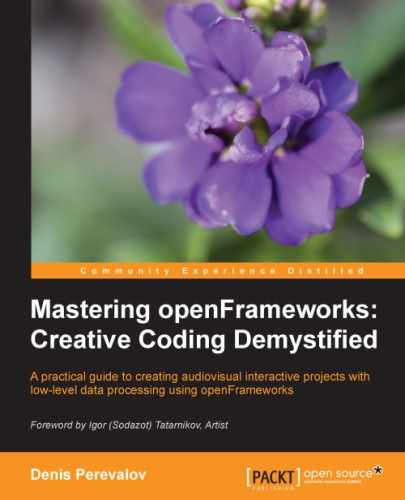Book Description
openFrameworks is the doorway to so many creative multimedia possibilities and this book will tell you everything you need to know to undertake your own projects. You’ll find creative coding is simpler than you think.
- Create cutting edge audio-visual interactive projects, interactive installations, and sound art projects with ease
- Unleash the power of low-level data processing methods using C++ and shaders
- Make use of the next generation technologies and techniques in your projects involving OpenCV, Microsoft Kinect, and so on
In Detail
openFrameworks is a powerful programming toolkit and library designed to assist the creative process through simplicity and intuitiveness. It's a very handy software library written in C++ to reduce the software development process, helping you to kick-start creative coding. With the help of C++ and shaders support, openFrameworks allows for the processing of all kinds of media information with your custom-developed algorithms at the lowest possible level, with the fastest speed.
"Mastering openFrameworks: Creative Coding Demystified" will introduce you to a world of creative coding projects, including interactive installations, audio-visual, and sound art projects. You will learn how to make your own projects using openFrameworks. This book focuses on low-level data processing, which allows you to create really unique and cutting-edge installations and projects.
"Mastering openFrameworks: Creative Coding Demystified" provides a complete introduction to openFrameworks, including installation, core capabilities, and addons. Advanced topics like shaders, computer vision, and depth cameras are also covered.
We start off by discussing the basic topics such as image and video loading, rendering and processing, playing sound samples, and synthesizing new sounds. We then move on to cover 3D graphics, computer vision, and depth cameras. You will also learn a number of advanced topics such as video mapping, interactive floors and walls, video morphing, networking, and using geometry shaders.
You will learn everything you need to know in order to create your own projects; create projects of all levels, ranging from simple creative-code experiments, to big interactive systems consisting of a number of computers, depth cameras, and projectors.
Table of Contents
- Mastering openFrameworks: Creative Coding Demystified
- Table of Contents
- Mastering openFrameworks: Creative Coding Demystified
- Credits
- Foreword
- About the Author
- Acknowledgement
- About the Reviewers
- www.PacktPub.com
- Preface
- 1. openFrameworks Basics
- About openFrameworks
- Installing openFrameworks and running your first example
- Installing on Mac OS with Xcode
- Installing on Linux with Code::Blocks
- openFrameworks' folders
- File structure of a project
- Code structure of a project
- Creating a new project
- Creating your first project – the Pendulum example
- Running the book's examples
- Basic utility functions
- Summary
- 2. Drawing in 2D
- 3. Building a Simple Particle System
- 4. Images and Textures
- 5. Working with Videos
- 6. Working with Sounds
- 7. Drawing in 3D
- 8. Using Shaders
- 9. Computer Vision with OpenCV
- 10. Using Depth Cameras
- 11. Networking
- A. Working with Addons
- B. Perlin Noise
- Index
